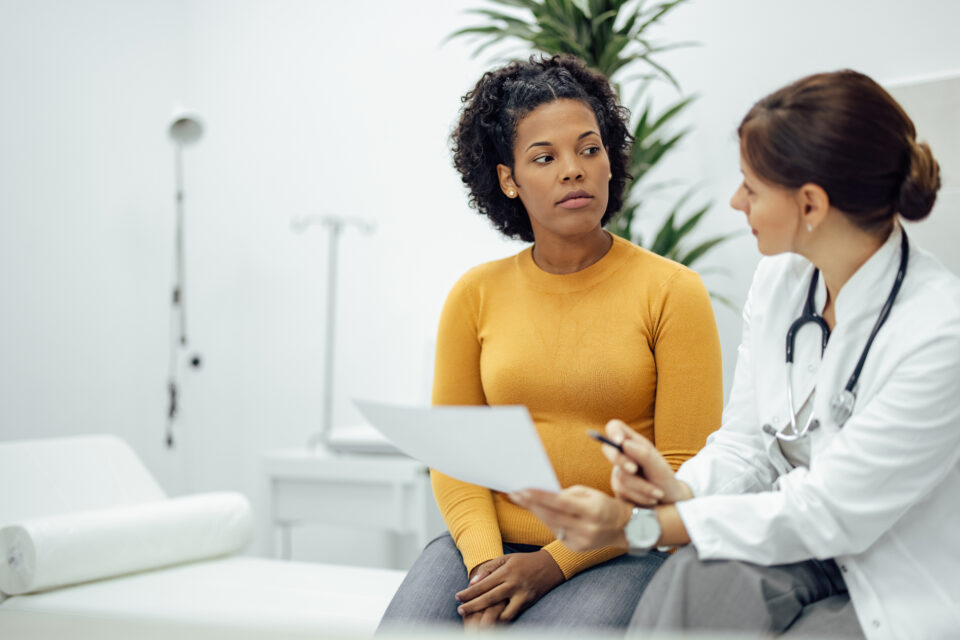HIV/Sexually Transmitted Diseases

Testing & Treatment
Sexually transmitted diseases affect individuals of all ages, but some of the highest rates of infection are in young people. Many STDs have no signs or symptoms but if left untreated can cause serious complications. It is important to get tested right away if you think you've been exposed.
Clinic Location and Hours
Medical Annex
4813 New Haven Ave.
Parking is free, and the clinic is located along a Citilink bus route, Bus No. 10.
Monday-Friday
8 a.m. to noon and 1 to 4:30 p.m.
All HIV and STD screenings and exams are by appointment only. To schedule an appointment:
- Call 260.449.7504 Monday-Friday from 8 a.m. to 4:30 p.m. and select option No. 1
- Schedule your HIV/STD testing appointment with the receptionist
- Print and complete a clinic intake form and bring it to your appointment
Some tests are done in our clinic and results are provided during your visit. Other tests need to be sent to an outside laboratory and may take up to two weeks before results are available. If results for certain diseases come back positive at your appointment you will be provided medication to treat it. You may need to return for further treatment for any positive results from tests sent to outside labs.
There is a minimal charge for STD services. The receptionist will be able to provide the most current pricing when scheduling your appointment.
What is it? A bacterial infection of the genital area.
Symptoms? Often there are no symptoms. For people with symptoms, there may be abnormal discharge from the penis or vagina and/or burning sensation when urinating. For women, abdominal pain or bleeding between periods.
Spread? Vaginal, oral or anal sex. It can also be passed from mother to child during childbirth.
Treatment? Oral antibiotics cure infection. Both partners must be treated at the same time to keep from passing the infection back and forth. Both partners should abstain from sex until the infection is gone.
Consequences? If left untreated, chlamydia can cause sterility (inability to have children) in both men and women.
What is it? A bacterial infection of the genital area.
Symptoms? Most infected people have no symptoms. For those who do, it can cause a burning sensation while urinating, abnormal white, green and/or yelllowish vaginal or penile discharge.
How is it spread? Vaginal, oral or anal sex. It can also be passed from mother to child during childbirth.
Treatment? Oral antibiotics can cure infection. Both partners must be treated at the same time to prevent passing the infection back and forth. Both partners should abstain from sex until the infection is gone.
Consequences? Gonorrhea can cause damage to women's fallopian tubes in women and men's sperm passageway.
What is it? A viral infection affecting the liver.
Symptoms? Many people don’t have any symptoms. People may experience tiredness, aches, nausea, vomiting, loss of appetite and yellowing of the skin and eyes (called jaundice).
How is it spread? Vaginal, oral, or anal sex. Also through childbirth if the baby does not get vaccinated against Hep B. Sharing contaminated needles or razors. Exposure to the blood, bodily fluids or saliva of an infected person.
Treatment? Most often, acute Hep B is treated with rest, eating well and lots of fluids. Chronic Hep B is treated through close monitoring by a doctor and anti-retroviral medications. There is a vaccine available to prevent Hep B.
Consequences? Increased risk of infection of other STDs including HIV. Hepatitis can also lead to chronic liver problems, cirrhosis or liver cancer.
What is it? The virus that causes AIDS.
Symptoms? Many people who are infected with HIV do not have any symptoms and feel healthy. Symptoms people get are usually related to infections and cancers due to a weakened immune system.
How is it spread? Vaginal, oral or anal sex. Sharing contaminated needles. Direct contact with infected blood. From mother to child during pregnancy, child birth or breast feeding.
Treatment? There is no cure for HIV or AIDS. Anti-retroviral treatment can slow the progression of HIV disease and delay the onset of AIDS. Early diagnosis and treatment can improve a person’s chances of living a longer, healthier life.
Consequences? AIDS is fatal if left untreated.
What is it? A bacterial infection that can spread in the body.
Symptoms? Symptoms can vary, beginning with a simple painful sore (called a chancre) on the mouth or sex organs. Other symptoms can appear up to six months after the first sore has disappeared.
How is it spread? Vaginal, oral or anal sex. It can also be passed through kissing if a sore is present, and from mother to child during childbirth.
Treatment? Antibiotics can cure syphilis if caught early, but medication cannot undo the damage already done. Both partners must be treated and avoid sexual contact until the sores are completely healed.
Consequences? Increased risk for infection of other STDs including HIV. It can also cause damage to brain, heart and nervous system if left untreated.
What is it? An infection of the genital area caused by a parasite called Trichomonas vaginalis.
Symptoms? Most infected people do not have symptoms. When symptoms do appear, they range from mild irritation to severe inflammation. Men may feel itching or irritation inside the penis, burning after urination or ejaculation or some discharge from the penis. Women may notice itching, burning, redness or soreness of the genitals, discomfort with urination or a thin discharge with an unusual smell that can be clear, white, yellowish, or greenish.
How is it spread? During sex, the parasite is usually transmitted from a penis to a vagina, or from a vagina to a penis, but it can also be passed from a vagina to another vagina. It is not common for the parasite to infect other body parts, like the hands, mouth or anus. It is unclear why some people with the infection get symptoms while others do not, but it probably depends on factors like the person’s age and overall health. Infected people without symptoms can still pass the infection on to others.
Treatment? Oral antibiotics can cure the infection. Both partners should abstain from sex until the infection is gone and symptoms go away.
Consequences? Having trichomoniasis can make it feel unpleasant to have sex and increases the risk of getting or spreading other STDs. The infection can last for months or even years without treatment.
What is it? A bacterial infection of the vaginal area.
Symptoms? Many women with Bacterial Vaginosis (BV) do not have symptoms. Some symptoms can include thin white or gray vaginal discharge, odor, pain, itching or burning in or around the vagina or while urinating. Some have a strong fish-like odor especially after sex.
How is it spread? BV is linked to an imbalance of “good” and “harmful” bacteria normally found in a woman’s vagina. BV is not considered an STD, but having BV can increase your chances of getting an STD. BV may also affect women who have never had sex.
Treatment? BV can be treated with antibiotics but will sometimes go away without treatment. Male sex partners of women diagnosed with BV generally do not need to be treated. However, BV may be transferred between female sex partners.
Consequences? BV can cause serious health risks, including increasing your chance of getting HIV or other STDs such as chlamydia and gonorrhea. The bacteria can sometimes cause pelvic inflammatory disease (PID), which can make it difficult or impossible for you to have children.
STD Outreach Clinic
The Department of Health STD Outreach Clinic is at 525 Oxford St. in Fort Wayne Wednesdays from 1 to 5 p.m.
No appointment is required. Patients are seen on a first-come, first-served basis for express STD testing and treatment only; full exams are not performed at this location. Testing for gonorrhea, chlamydia, syphilis, HIV and Hepatitis C is available depending on identified risks.

Eligibility
To be eligible for services you must be uninsured or under-insured AND meet one of the following criteria:
- Under age 30
- Diagnosed with gonorrhea or chlamydia but not yet treated
- Had sexual contact with someone diagnosed with gonorrhea or chlamydia
- A man who has sex with other men
- Had anal sex within the last two months (men or women)
- Have symptoms suggestive of an STD (burning during urination, penile or vaginal discharge)
- Currently pregnant
- Seeking a retest for a gonorrhea or chlamydia infection treated in the last six months
Cost
Cost is $10 for middle and high school students and $21 for adults. Please call 260.449.3510 if you have questions about this clinic, the services and whether you qualify.
STD Counseling & Partner Notification
Our trained specialists educate clients about each sexually transmitted disease and ways to control their spread.
Sexual partners voluntarily shared with the Department staff are also notified they have been exposed to a STD and encouraged to visit the clinic for screening services. This information is confidential, and the person who named partners potentially exposed remains anonymous.
Call to schedule your HIV/STD testing appointment today!